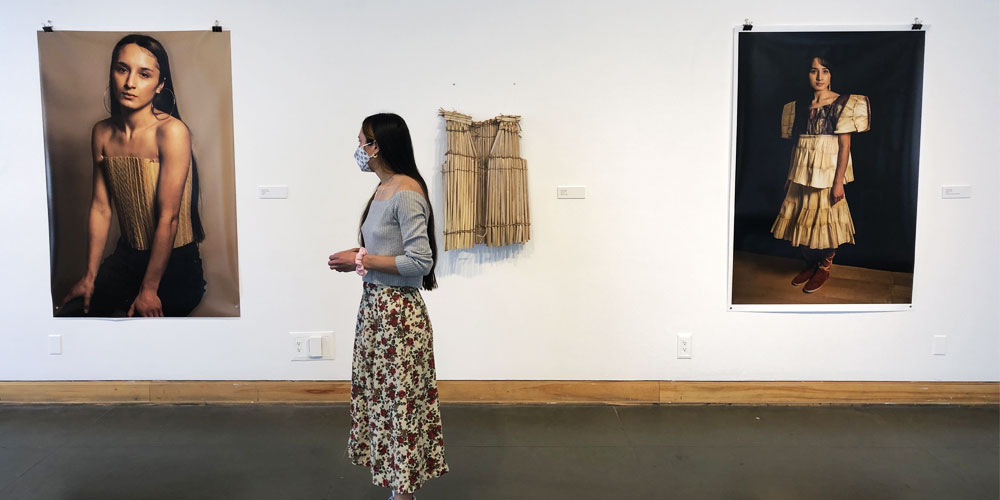
Maura Tamez with her artwork in Storytellers, at the Kelowna Art Gallery
Maura Tamez always knew she wanted to pursue a practice in the visual arts. She recently completed her third year of studies in the BFA program at UBC Okanagan. She is an enrolled member of the Lipan Apache Band, Texas (of the broader Dene peoples in Canada, U.S., Mexico), and is currently living along N’sis’oolwx (Dry Creek) on the Okanagan Indian Band #1 reserve near Vernon, BC in unceded Syilx territory.
“Visual Arts has always been an area that I saw myself thriving in.”
This year, Maura was awarded an inaugural Indigenous Arts Scholarship offered by the First Peoples’ Cultural Council and made possible with funding from the BC Arts Council. This scholarship supports the development of First Nations, Métis, and Inuit artists in BC with funding for education or mentorship.
“It is encouraging and affirming to have been awarded this scholarship based on the recognition of my strong work ethic, high academic achievements, and on the merit of my portfolio of artistic work” Maura says.
She learned about the scholarship opportunity through the network of her faculty mentors in the Faculty of Creative and Critical Studies. She applied for the scholarship as she sought an opportunity to attend university full-time without the distractions of working two or more jobs required to support her studies. This scholarship has provided her with the ability to apply herself fully for the first time in her undergraduate education.
“It is an honor and deeply encouraging to know that the jury believes in me, the strength of my ideas, and the value of my artistic practice.” She adds, “I am thankful to the First Peoples’ Cultural Council and the BC Arts Council for their continued support to young Indigenous artists who are pursuing post-secondary education.”
Renay Egami, professor of Visual Arts, was one of the people who encouraged Maura to apply for this award.
“I believe that Maura is among a new generation of Indigenous artists who holds promise and has a bright future ahead of her” says Egami.
Maura says that professor Egami has been a vital mentor, teacher, and role model since her first year in university.
“Renay has always encouraged me to explore new methods in my sculpture practice and to refine my skills, critical thinking, and knowledge. As a racialized Indigenous woman, the significance of the professional mentorship and support received from a strong woman of colour cannot be understated. She has given me the confidence to apply decolonization in all my approaches and this makes a tremendous difference in the results I am able to achieve,” she says.
Currently in her art practice, Maura has been working with ‘hadntn’ (cattail), an important medicine to her family and Ndé peoples. She is learning more about hadntn and looking at the plant as something not only used for its medicinal qualities and ceremony, but as well as a material for artmaking and ultimately weaving this into her practice.
“My art is about place, Ndé history, and my own experiences as a Ndé woman. By working with hadntn in different ways is to honour all of its roles.”
Maura has been busy with her courses as well as working on art projects outside of her schoolwork. She recently had her work shown at the Kelowna Art Gallery as part of Storytellers, an exhibition organized by the Arts Council of the Central Okanagan. Her work in the exhibition are self-portraits and sculptures using corn husks to re-create her traditional regalia.
She was also recently awarded one of the FCCS Undergraduate Reseach Awards to work on a project over the summer months. With this award, Maura will create an experimental film based on her own perspectives of Indigenous life, experiences, and creation stories.
When asked what she would say to her first-year self, Maura says that she would tell herself to rest. A critical understanding of holistic well-being, balance, and pacing is a necessary formula for success in strenuous environments, such as the university. “I try to take time for reflection and self-care, especially as I approach the final year of my degree.”
“It is easy to get caught up in perfectionism. I am just now learning that ‘excellence’ is a form of colonial oppression imposed upon Indigenous peoples as a part of ongoing colonization.”
After she graduates in 2022, she says she is planning to take a year off from school before looking at opportunities to pursue her Master of Fine Arts degree.
“During this time, I will be applying to artist residencies. The Banff Centre for the Arts is on my mind!”
About the Indigenous Art Scholarship
The Indigenous Art Scholarship supports the development of First Nations, Métis, and Inuit artists and arts practitioners residing in B.C. with funding for education or mentorship.
The Indigenous Arts Scholarship provides up to $20,000 in funding to students in full-time mentorship training and up to $10,000 for students enrolled in post-secondary education. The scholarship is made possible with funding from the BC Arts Council.
Find out more: fpcc.ca/program/indigenous-arts-scholarship